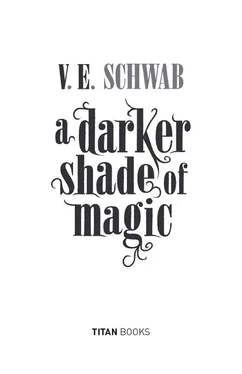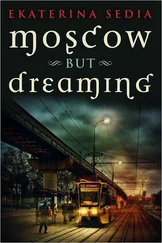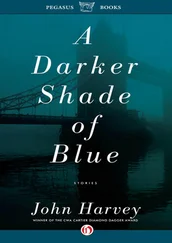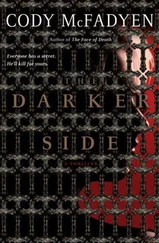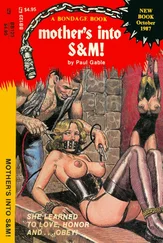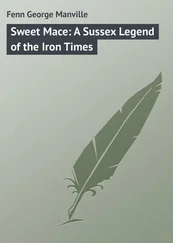V.E Schwab - A Darker Shade of Magic
Здесь есть возможность читать онлайн «V.E Schwab - A Darker Shade of Magic» весь текст электронной книги совершенно бесплатно (целиком полную версию без сокращений). В некоторых случаях можно слушать аудио, скачать через торрент в формате fb2 и присутствует краткое содержание. Год выпуска: 2015, Издательство: Titan Books, Жанр: Старинная литература, на английском языке. Описание произведения, (предисловие) а так же отзывы посетителей доступны на портале библиотеки ЛибКат.
- Название:A Darker Shade of Magic
- Автор:
- Издательство:Titan Books
- Жанр:
- Год:2015
- ISBN:нет данных
- Рейтинг книги:4 / 5. Голосов: 1
-
Избранное:Добавить в избранное
- Отзывы:
-
Ваша оценка:
- 80
- 1
- 2
- 3
- 4
- 5
A Darker Shade of Magic: краткое содержание, описание и аннотация
Предлагаем к чтению аннотацию, описание, краткое содержание или предисловие (зависит от того, что написал сам автор книги «A Darker Shade of Magic»). Если вы не нашли необходимую информацию о книге — напишите в комментариях, мы постараемся отыскать её.
A Darker Shade of Magic — читать онлайн бесплатно полную книгу (весь текст) целиком
Ниже представлен текст книги, разбитый по страницам. Система сохранения места последней прочитанной страницы, позволяет с удобством читать онлайн бесплатно книгу «A Darker Shade of Magic», без необходимости каждый раз заново искать на чём Вы остановились. Поставьте закладку, и сможете в любой момент перейти на страницу, на которой закончили чтение.
Интервал:
Закладка:
Astrid had draped herself over one of the two thrones, her long thin body like taut wire under her clothes. Sinewy, but far from weak. She fiddled with a pendant at her neck, its surface like frosted glass, its edges as red as freshly drawn blood. Strange , thought Kell, to see something so bright in White London.
“I smell something sweet,” she said. She’d been gazing up at the ceiling. Now her eyes wandered down and landed on Kell. “Hello, flower boy.”
The queen spoke in English. Kell knew that she hadn’t studied the language, that she—like Athos—relied on spellwork instead. Somewhere under her close-fitting clothes, a translation rune was scarred into her skin. Unlike the desperate tattoos made by the power hungry, the language rune was a soldier’s response to a politician’s problem. Red London treated English as a mark of high society, but White London found little use for it. Holland had told Kell once that this was a land of warriors, not diplomats. They valued battle more than ballrooms and saw no value in a tongue that their own people did not understand. Rather than waste years learning the common tongue between kings, those who took the throne simply took the rune as well.
“Your Majesty,” said Kell.
The queen drew herself up into a sitting position. The laziness of her motions was a farce. Astrid Dane was a serpent, slow only until she chose to strike. “Come closer,” she said. “Let me see how you’ve grown.”
“I’ve been grown for some time,” said Kell.
She drew a nail down the arm of the throne. “Yet you do not fade.”
“Not yet,” he said, managing a guarded smile.
“Come to me,” she said again, holding out her hand. “Or I will come to you.”
Kell was not sure if it was a promise or a threat, but he had no choice regardless, and so he stepped forward into the serpent’s nest.

III

The whip cracked through the air, the forked end splitting open the skin of the boy’s back. He did not scream—Athos wished he would—but a gasp of pain whistled through his clenched teeth.
The boy was pinned against a square metal frame like a moth, his arms spread wide, wrists bound to each of the two vertical bars that formed the square’s sides. His head hung forward, sweat and blood trickling down the lines of his face, dripping from his chin.
The boy was sixteen, and he had not bowed.
Athos and Astrid had ridden through the streets of White London on their pale steeds, surrounded by their empty-eyed soldiers, relishing the fear in their people’s eyes, and with it, their obedience. Knees hit stone. Heads bowed low.
But one boy—Athos later learned his name was Beloc, the word coughed through bloody lips—stood there, his head barely tipped forward. The eyes of the crowd had gone to him, a visceral ripple rolling through them—shock, yes, but underneath it, amazement bordering on approval. Athos had pulled his horse to a stop and gazed down at the boy, considering his moment of stubborn youthful defiance.
Athos had been a boy once, of course. He had done foolish, headstrong things. But he had learned many lessons in the struggle for the White crown, and many more since taking it as his own, and he knew above all that defiance was like a weed, something to be ripped out at the roots.
On her steed, his sister watched, amused, as Athos tossed a coin to the boy’s mother, who stood beside him.
“Öt vosa rijke,” he said. “For your loss.”
That night, the empty-eyed soldiers came, broke down the doors of Beloc’s small house, and dragged the boy kicking and screaming and hooded into the street, his mother held back by a spell scrawled across the stone walls, unable to do anything but wail.
The soldiers dragged the boy all the way to the palace and delivered him, bloody and beaten, to the glittering white floor in front of Athos’s throne.
“Look at this,” Athos chided his men. “You’ve hurt him.” The king stood and looked down at the boy. “That’s my job.”
Now the whip split air and flesh again, and this time, at last, Beloc screamed.
The whip cascaded from Athos’s palm like liquid silver, pooling on the ground beside his boot. He began to coil it around his hand.
“Do you know what I see in you?” He wound the silver rope and slid it into a holster at his waist. “A fire.”
Beloc spit blood on the floor between them. Athos’s lips twisted. He strode across the chamber, caught hold of the boy’s face by his jaw, and slammed his head back against the wood of the frame. Beloc groaned in pain, the sound muffled by Athos’s hand over his mouth. The king brought his lips to the boy’s ear.
“It burns through you,” he whispered against the boy’s cheek. “I cannot wait to carve it out.”
“Nö kijn avost,” growled Beloc when the king’s hand fell away. I don’t fear death.
“I believe you,” said Athos smoothly. “But I’m not going to kill you. Though, I’m sure,” he added, turning away, “you’ll wish I had.”
A stone table stood nearby. On it sat a metal chalice filled with ink, and beside it, a very sharp blade. Athos took up both and brought them to Beloc’s pinned body. The boy’s eyes widened as he realized what was about to happen, and he tried to fight against his binds, but they did not give.
Athos smiled. “You have heard then, about the marks I make.”
The whole city knew of Athos’s penchant—and his prowess—for binding spells. Marks that stripped away a person’s freedom, their identity, their soul. Athos took his time readying the knife, letting the boy’s fear fill the room as he swirled the metal through the ink, coating it. The length of the blade was grooved, the ink filling the notch as if it were a pen. When it was ready, the king drew the stained knife out, the gesture seductively slow, cruel. He smiled, and brought the tip to the boy’s heaving chest.
“I’m going to let you keep your mind,” said Athos. “Do you know why?” The blade’s tip bit in, and Beloc gasped. “So I can watch the war play in your eyes every time your body obeys my will instead of yours.”
Athos pressed down, and Beloc bit back a scream as the knife carved its way across his flesh, down his collar, over his heart. Athos whispered something low and constant as he drew the lines of the binding spell. Skin broke, and blood welled and spilled into the blade’s path, but Athos seemed unbothered, his eyes half closed as he guided the knife.
When it was over, he set the blade aside and stepped back to admire his work.
Beloc was slumped against his binds, chest heaving. Blood and ink ran down his skin.
“Stand up straight,” commanded Athos, satisfaction washing over him as he watched Beloc try to resist, his muscles shuddering against the instruction before giving in and dragging his wounded body up into a semblance of posture. Hatred burned through the boy’s eyes, bright as ever, but his body now belonged to Athos.
“What is it?” asked the king.
The question wasn’t directed at the boy, but at Holland, who had appeared in the doorway. The Antari ’s eyes slid over the scene—the blood, the ink, the tortured commoner—his expression lodged between distant surprise and disinterest. As if the sight meant nothing to him.
Which was a lie.
Holland liked to play at being hollow, but Athos knew it was a ruse. He might have feigned numbness, but he was hardly immune to sensation. To pain.
“Ös-vo tach?” asked Holland, nodding at Beloc. Are you busy?
Читать дальшеИнтервал:
Закладка:
Похожие книги на «A Darker Shade of Magic»
Представляем Вашему вниманию похожие книги на «A Darker Shade of Magic» списком для выбора. Мы отобрали схожую по названию и смыслу литературу в надежде предоставить читателям больше вариантов отыскать новые, интересные, ещё непрочитанные произведения.
Обсуждение, отзывы о книге «A Darker Shade of Magic» и просто собственные мнения читателей. Оставьте ваши комментарии, напишите, что Вы думаете о произведении, его смысле или главных героях. Укажите что конкретно понравилось, а что нет, и почему Вы так считаете.
